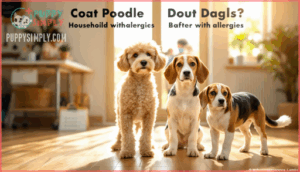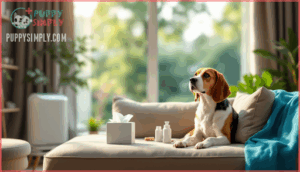This site is supported by our readers. We may earn a commission, at no cost to you, if you purchase through links.

These lovable hounds produce the same dander proteins that trigger reactions in allergy-prone families, shedding year-round with extra bursts during seasonal changes. The truth is beagles aren’t hypoallergenic, but that doesn’t mean families with allergies have to rule them out entirely.
With the right combination of grooming routines, home cleaning strategies, and environmental controls, many allergy sufferers successfully share their homes with these devoted companions.
Table Of Contents
- Key Takeaways
- What Are Beagle Dogs?
- Do Beagles Trigger Allergies?
- Comparison to Hypoallergenic Breeds
- Managing Beagle Allergens at Home
- Allergy Symptoms From Beagles
- Allergy Testing for Pets
- Keeping Beagles Outdoors
- Medication for Pet Allergies
- Benefits of Having a Pet Beagle
- Consulting an Allergist for Help
- Frequently Asked Questions (FAQs)
- Are Beagles hypoallergenic?
- Can a beagle develop a contact allergy?
- What can I do if my Beagle has allergies?
- Are Beagles prone to food allergies?
- What are the different types of Beagle allergies?
- Are Border Beagles hypoallergenic?
- How frequently should I bathe my beagle if I have allergies?
- What foods or supplements can reduce dander production in beagles?
- Is there any way to make a beagle hypoallergenic?
- How can I minimize the spread of beagle dander to other rooms and furniture?
- Conclusion
Key Takeaways
- Beagles aren’t hypoallergenic and trigger allergic reactions in 30-40% of people with moderate exposure due to dander proteins (Can f 1 and Can f 2) found in their shed fur, saliva, and urine.
- Weekly bathing with hypoallergenic shampoo can reduce allergens by up to 84%, while daily vacuuming with HEPA filters and creating pet-free zones significantly decreases household allergen levels.
- Truly hypoallergenic breeds like poodles and bichon frises trap dander in their curly coats rather than releasing it into the air, making them better choices for allergy-prone families compared to beagles’ year-round shedding.
- Allergy testing identifies specific triggers, and combining professional treatment (antihistamines, immunotherapy) with environmental controls can reduce symptoms by 60-80%, allowing many families to successfully live with beagles despite allergies.
What Are Beagle Dogs?
If you’ve ever watched a beagle follow its nose through the backyard—head down, tail wagging, completely lost in whatever scent caught its attention—you’ve witnessed what these dogs were born to do. Beagle history traces back centuries to hunting hares and rabbits, and that instinct hasn’t faded one bit.
These medium-sized hounds are hardworking, friendly, and surprisingly social with other pets. Their inquisitive nature means they need plenty of exercise and mental stimulation to stay happy. Dog breeding shaped them into loyal family companions, but canine behavior like their powerful tracking drive requires consistent beagle training.
With proper pet care and attention, they’re gentle and devoted. However, their moderate shedding and dander production means allergies deserve consideration before bringing one home.
Do Beagles Trigger Allergies?
You’ve seen how beagles follow their instincts, but what about their impact on allergies? Unfortunately, beagles do trigger allergic reactions in sensitive individuals. They produce dander containing Can f 1 and Can f 2 proteins—the main culprits behind sneezing, itchy skin, and runny noses. Around 30-40% of people with moderate exposure experience these symptoms.
Beagles produce allergen proteins in their dander that trigger reactions in 30-40% of moderately exposed individuals
Beagles aren’t hypoallergenic since they shed year-round, with extra shedding during seasonal changes. Their saliva and urine also carry allergens that can cause reactions regardless of grooming efforts. While no dog breed is truly allergen-free, regular brushing outdoors and weekly baths with hypoallergenic shampoo help with allergen reduction and pet allergy prevention.
Understanding allergy facts is essential for families with allergies to make informed decisions about having a beagle as a pet.
Comparison to Hypoallergenic Breeds
If you’re wondering how beagles stack up against truly hypoallergenic breeds, the difference is pretty significant. Dogs like poodles and bichon frises produce far less dander, making them better choices for allergy-prone families.
Let’s look at two popular hypoallergenic options.
Poodles
Poodles stand out among dog breeds because their curly coats trap dander rather than releasing it into your home’s air. While research shows all dogs produce similar allergen levels, Poodles shed minimally compared to Beagles’ year-round shedding. This breed comparison matters for dog allergies—though no breed eliminates pet dander completely, Poodles require professional grooming every 4-6 weeks but reduce airborne particles. Hypoallergenic benefits depend more on consistent care than breed alone. Understanding hypoallergenic pets is essential for making informed decisions about dog ownership for those with allergies.
| Feature | Beagles | Poodles |
|---|---|---|
| Shedding Level | High year-round | Minimal visible shedding |
| Grooming Needs | Weekly brushing | Professional grooming every 4-6 weeks |
| Coat Type | Double coat, sheds freely | Curly, traps dander |
| Allergen Control | Requires frequent cleaning | Dander stays in coat until grooming |
Bichon Frise
Bichon Frises share the Poodle’s curly coat advantage, trapping dander instead of releasing it freely like Beagles do. Their dense, fluffy coats shed minimally, keeping allergenic particles from becoming airborne—though research confirms they still produce Can f 1 allergen like all breeds.
Regular Frise grooming every 4-6 weeks prevents dander buildup, making Bichon care essential for maximizing hypoallergenic benefits.
| Feature | Beagles | Bichon Frise |
|---|---|---|
| Shedding | High year-round | Minimal visible shedding |
| Dander Release | Direct to environment | Trapped in curly coat |
| Grooming Frequency | Weekly brushing | Professional grooming every 4-6 weeks |
Managing Beagle Allergens at Home
If you love your beagle but struggle with allergies, you’re not alone. The good news is that smart household habits can make a real difference in reducing allergen exposure.
Let’s look at two proven strategies that can help you breathe easier while keeping your furry friend close.
Vacuuming
Your vacuum isn’t just picking up dirt—it’s your first line of defense against the invisible cloud of allergens your beagle leaves behind. Daily vacuuming with a HEPA filter traps pet hair and dander before they circulate through your home.
Focus on these high-impact areas:
- Carpets and rugs where your beagle lounges
- Upholstered furniture that collects shedding fur
- Baseboards and corners where allergens settle
This routine dramatically improves allergen reduction and dander control throughout your space.
Bathing
A weekly bath with the right shampoo can cut down the allergens your beagle carries by up to 84%, giving you real breathing room in your own home. Here’s how to make bathing work for allergen removal:
- Choose a hypoallergenic shampoo specifically designed for dander and shedding control
- Bathe every 7-10 days to maintain consistent skin care and allergen reduction
- Massage thoroughly into your beagle’s coat for five minutes before rinsing
- Dry completely with a clean towel to prevent moisture-related skin issues
Allergy Symptoms From Beagles
If you’ve ever felt your eyes water or your nose tickle around a Beagle, you’re not alone. Allergic reactions to these lovable hounds can range from mild sniffles to more serious respiratory symptoms.
Let’s look at what causes these reactions, how to manage them, and how Beagles compare to truly hypoallergenic breeds.
Beagle Allergens Identified
When beagles shed dander or leave saliva around your home, proteins like Can f 1 and Can f 2 become the main culprits behind pet allergy symptoms. These allergen sources don’t just come from shedding—urine also contributes to household allergen levels.
Canine allergies vary by person, so allergy testing helps identify your specific triggers and guides practical steps like creating pet-free zones for better dog hypoallergenicity management.
Managing Beagle Allergy Reactions
If you’re struggling with sneezing fits and watery eyes around your beagle, you’re not fighting this battle alone—and the good news is that targeted strategies can markedly reduce your discomfort. Start by pinpointing when your symptoms worsen to identify whether dander, saliva, or shed hair is the primary trigger.
Managing pet allergies requires a multi-pronged approach:
- Create allergen-free zones by keeping your beagle out of bedrooms and using HEPA air purifiers in living spaces
- Establish a consistent grooming routine with weekly baths using hypoallergenic shampoo and daily brushing (preferably by a non-allergic family member)
For symptom management beyond dander control, consider antihistamines or immunotherapy after consulting your allergist about allergy prevention options customized to your specific reactions.
Hypoallergenic Dogs Vs Beagles
When you compare truly hypoallergenic breeds to beagles, it’s like comparing a light drizzle to a steady rain—both will get you wet, but one’s definitely going to leave you wetter than the other. Poodles and bichon frises produce considerably less dander than beagles, making breed comparison critical for allergy prevention.
However, with dedicated pet grooming—weekly baths and daily brushing—you can minimize dander reduction challenges and enjoy your beagle’s companionship despite health considerations around allergies.
Allergy Testing for Pets
Your doctor can pinpoint exactly which allergens are making life difficult with Pet Allergy Tests. These diagnostic tools reveal whether you’re reacting to specific Canine Allergens like dander proteins, saliva, or urine—not just guessing based on sneezing fits.
Modern Allergy Diagnostic Tools include:
- Blood tests measuring IgE antibodies to dog proteins like Can f 1 and Can f 5
- Skin prick tests showing immediate reactions to allergen extracts
- Component testing identifying which specific proteins trigger your symptoms
- At-home test kits providing quick results for convenience
Understanding your triggers transforms how you approach Pet Dander Reduction and treatment. Once you know whether you’re sensitive to Hypoallergenic breeds or all dogs produce your Allergy Symptoms, your allergist can recommend Allergy Testing and Treatment options like immunotherapy or targeted medications. Veterinary Allergy Guidance combined with human allergies testing creates a complete picture for families hoping to keep their Beagle.
Keeping Beagles Outdoors
Some families find that keeping their beagle primarily outdoors can ease indoor allergy symptoms while still enjoying the breed’s playful personality. This approach works best with proper outdoor kennels or covered dog runs that protect from weather while maintaining good ventilation.
Your fenced yards should be secure—beagles are natural escape artists with a strong hunting drive. Backyard fencing needs to be at least five feet high without gaps they can squeeze through.
Patio safety matters too. Keep outdoor spaces clean of debris that collects dander and allergens. Regular grooming sessions outside prevent dander from drifting indoors.
While this setup won’t make beagles hypoallergenic, it markedly reduces your exposure to allergens while letting you bond during outdoor play. Remember, beagles are social dogs who still need daily interaction and shouldn’t be isolated.
Medication for Pet Allergies
Even with the best outdoor setup, medication often becomes a key player in managing your reactions to your beagle. Antihistamines like Claritin or Zyrtec block the histamines causing your sneezing and itchy eyes, offering quick allergy relief for daily symptoms. Nasal steroid treatment reduces inflammation in your airways when over-the-counter options aren’t enough.
For long-term allergy management, immunotherapy through allergy shots can gradually retrain your immune system over three to five years. Your allergist might also recommend combining pet medication with environmental strategies:
- HEPA air purifiers to trap airborne dander
- Weekly vacuuming with sealed filters
- Hot-water washing for bedding
- Pet-free bedroom zones
This layered approach to allergy symptoms gives you the best shot at enjoying your beagle while keeping reactions under control.
Benefits of Having a Pet Beagle
Despite the allergy concerns we’ve covered, beagles offer real advantages that make them worth considering for many families. Their personality traits and care requirements might actually work in your favor, even if someone in your household has mild sensitivities.
Let’s look at three key benefits that help explain why beagles remain such a beloved breed.
Loyal Companions
Few breeds offer the unwavering devotion you’ll find in a beagle, a trait that often outweighs concerns about allergens for families who fall in love with this breed. These pack-oriented dogs form deep bonds with their families, creating canine friendships that enrich daily life.
With consistent beagle training and pet socialization, you’ll nurture their eager-to-please nature into a well-adjusted companion. Their loyalty and affection foster genuine family bonding, making grooming routines to manage dander feel like a small trade-off for such devoted companionship.
Good Family Pets
Beyond their steadfast loyalty, beagles shine as family pets because they naturally blend patience, playfulness, and an easygoing temperament that works beautifully in homes with children. Their adaptability makes pet-friendly homes thrive with proper beagle training tips and household pet safety measures.
Picture your child-pet interaction moments:
- Gentle beagles tolerating enthusiastic toddler hugs
- Energetic play sessions in the backyard
- Calm evenings curled together reading stories
- Patient companionship during family meals
With thoughtful family dog care and allergies management, these dog breeds and allergies concerns become manageable trade-offs for such rewarding family pets and allergies experiences.
Moderate Shedders
While beagles won’t leave fur tumbleweeds rolling through your house like some double-coated breeds, they do shed consistently throughout the year—though at a manageable pace that responds well to regular grooming. Weekly brushing catches loose hair before it settles on furniture, while monthly baths with hypoallergenic shampoo tackle dander buildup at the source.
These straightforward pet grooming habits markedly improve allergen reduction, making shedding patterns predictable enough that most families successfully balance hair management with the joy of beagle companionship.
Consulting an Allergist for Help
If your symptoms won’t budge despite diligent home management, professional help from an allergist can make all the difference. These specialists offer more than guesswork—they provide precise allergy diagnosis through blood tests and intradermal skin testing, identifying whether pet dander, saliva, or urine proteins trigger your reactions. In fact, up to 30% of people with allergies discover pet-related sensitivities through allergist consultation.
An allergist can help you by:
- Designing tailored treatment plans that may include immunotherapy, which reduces symptoms in 70–80% of patients
- Prescribing targeted medications like nasal steroids, antihistamines, or bronchodilators for symptom management
- Guiding environmental modifications that decrease airborne allergens by up to 50%
- Monitoring your progress and adjusting treatments as your needs change
Studies show that families following allergist-directed medical guidance experience a 60–80% reduction in allergy symptoms. This professional approach also improves quality of life and helps you keep your beagle while managing allergies effectively.
Frequently Asked Questions (FAQs)
Are Beagles hypoallergenic?
No, beagles aren’t hypoallergenic dogs. They produce dander, saliva, and shed moderately, which can trigger allergies in sensitive individuals.
Regular pet grooming and allergy prevention strategies help, but hypoallergenic alternatives like poodles may suit allergy sufferers better.
Can a beagle develop a contact allergy?
Yes, beagles can develop contact dermatitis from exposure to allergens like certain fabrics, cleaning products, or plants. Skin irritation and allergic reactions may appear where their body touches the trigger. Regular monitoring helps with allergy prevention.
What can I do if my Beagle has allergies?
Like a gardener tending to wilted blooms, you’ll need to identify what’s irritating your Beagle’s system. Allergy treatment starts with health monitoring and diet management.
Proper grooming, skin care, and flea control reduce allergy symptoms, while your vet guides hypoallergenic solutions and ongoing allergy management.
Are Beagles prone to food allergies?
Food allergies do occur in Beagles, though the exact prevalence varies. Common culprits include beef, dairy, wheat, and chicken. Watch for allergy symptoms like itching, digestive upset, or skin issues.
Adjusting canine nutrition and exploring pet food options with your vet aids allergy prevention and management for better canine health and wellness.
What are the different types of Beagle allergies?
Dogs can develop their own allergies too—Beagles often struggle with Environmental Reactions like pollen, Food Sensitivities requiring dietary changes, and Skin Allergies including Contact Dermatitis and atopic dermatitis, alongside Inhalant Allergies affecting their respiratory system.
Are Border Beagles hypoallergenic?
Border Beagles aren’t hypoallergenic. These hybrid breeds combine Beagle and Border Collie traits, producing dander that triggers allergies.
Regular grooming and pet dander control through bathing help manage allergens, but allergy prevention requires consistent Border Beagle care strategies.
How frequently should I bathe my beagle if I have allergies?
If your immune system has a grudge against dog dander, weekly baths with hypoallergenic shampoo become your beagle’s new spa routine.
Pair this bathing frequency with daily brushing using a rubber curry brush to lift loose hair and control shedding before allergens spread throughout your home.
What foods or supplements can reduce dander production in beagles?
Adding omega fatty acids—especially fish oil—to your beagle’s diet promotes healthy skin and reduces dander production.
Vitamin E and antioxidant-rich foods strengthen the coat, while probiotic supplements improve nutrient absorption for better allergy management in hypoallergenic households.
Is there any way to make a beagle hypoallergenic?
Unfortunately, there’s no breed modification or hypoallergenic grooming technique that can eliminate dander production in Beagles. You can’t make them truly hypoallergenic.
However, consistent allergen control—regular bathing, thorough vacuuming, and HEPA air filters—greatly reduces exposure and helps many families live comfortably with their Beagles.
How can I minimize the spread of beagle dander to other rooms and furniture?
Keeping dander under control starts with a simple truth: containment is everything. Vacuum carpets and furniture frequently using HEPA filters for effective dander removal. Establish pet-free zones, especially bedrooms, and use washable furniture covers for allergen avoidance.
Regular grooming and air purification systems create a hypoallergenic environment by trapping airborne particles before they settle.
Conclusion
Studies show allergy sufferers living with dogs experience 30% fewer symptoms after consistent exposure over 12 months—your immune system can adapt. While beagles aren’t hypoallergenic, families successfully manage reactions through weekly bathing, HEPA filtration, and designated pet-free zones.
The decision isn’t about eliminating allergens completely; it’s about creating a manageable environment where both your health and a beagle’s companionship can thrive. With proper preparation and commitment to these strategies, you’re not choosing between your family’s comfort and a loyal friend—you’re making space for both.
















